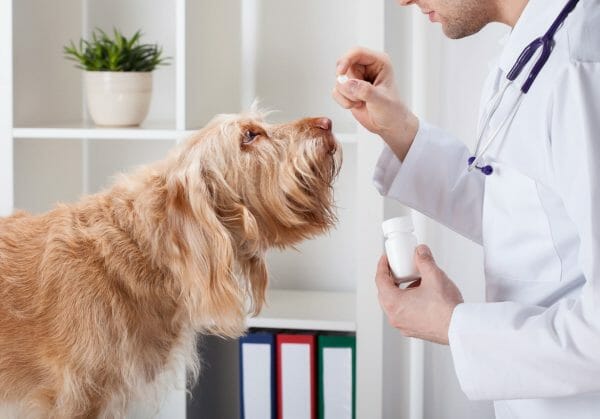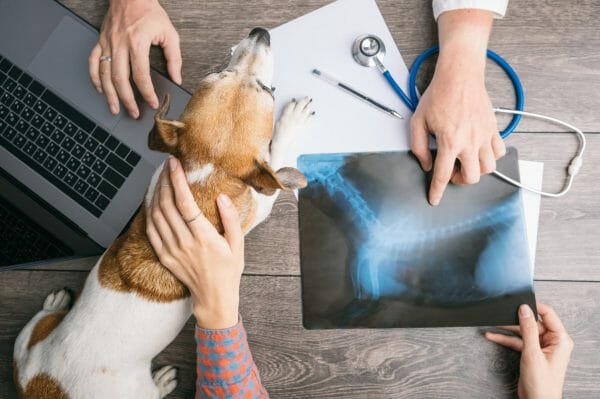Gabapentin Uses as Prescribed by a Vet for Your Dog
What Is Gabapentin?
Although Gabapentin is primarily used for humans, animals have also been found to benefit from the drug. Gabapentin is a common medication used to both stop seizures and work as a pain reliever. Gabapentin for dogs can improve your dogs life. Read more information and contact your veterinarian to see if it’s the right fit for your dog.
Gabapentin works similarly like a neurotransmitter, in that it successfully suppresses nerve firing, which produces pain. This helps relieve nerve pain. It also works to equalizes the surplus of electrical activity in the brain that exists in those suffering from seizures.
It is vitally important that Gabapentin, a prescribed drug, be used only if a vet has approved it for a dog on a case-by-case basis.
Some dogs are unable to take the drug due to preexisting conditions, such as kidney disease. The dog’s vet will best be able to determine, based on the dog’s medical history, if the dog is safely able to take Gabapentin.
What Is Gabapentin Used for in Dogs?
Gabapentin, also known by its brand name Neurontin, targets conditions in the nervous system and is utilized to:
- Decrease chronic pain, especially nerve pain associated with arthritis or cancer treatment.
- Act as an agent that prevents seizures or convulsions in those dogs prone to them.
- Act as a sedative to calm a dog down before undergoing something anxiety-provoking, like a trip to the vet or surgery.
In the treatment of pain, Gabapentin for dogs is most frequently coupled with an NSAID, or some other anti-inflammatory drug. In this way, Gabapentin works well to aid the drug in bringing about more potent pain alleviation to the dog.
Gabapentin Dosage for Dogs
 Gabapentin is only one of the countless pain-relieving drugs available to dogs. In order to protect a dog and keep it in good health, it is crucially important to leave the decision on what drug is best up to the veterinarian. Only a board-certified vet will be able to accurately and safely determine the proper drug or dosage for a specific dog.
Gabapentin is only one of the countless pain-relieving drugs available to dogs. In order to protect a dog and keep it in good health, it is crucially important to leave the decision on what drug is best up to the veterinarian. Only a board-certified vet will be able to accurately and safely determine the proper drug or dosage for a specific dog.
Per 1800PetMeds.com:
In terms of dosage, the average dose to treat seizures is between 4.5 mg and 13.5 mg per every pound the dog weighs. This is given between every 8 to 12 hours. For pain relief, the dosage is much smaller at only 1.4 mg, once per day.
Gabapentin can come as a liquid, capsule, or tablet. The capsule form is most common, coming in 100 mg, 300 mg, 400 mg, and 600 mg capsules. For this reason, dosage amounts should be measured with special care and attention to avoid overdose, per the instructions of the dog’s vet.
Warnings Regarding Gabapentin
Whatever form is taken, it should always be approved for canines. Gabapentin for humans can be toxic if given to a dog. For instance, do not use the liquid version of Gabapentin due to the inclusion of xylitol. Xylitol is deadly for dogs.
It is also important for dog owners to follow the vet’s instructions exactly. Missing doses and stopping administration of Gabapentin can cause adverse reactions in the dog, such as withdrawal seizures.
Again, all dosages should be expertly determined by the dog’s veterinarian, not by an informational article or website.
For any questions or concerns regarding Gabapentin, the administration of it, or dosage amounts, contact the dog’s vet before any consultation is done with online articles and sites.
What If I Miss a Dose?
If a dose of Gabapentin is not given to the dog at the designated time, the dose should still be given, if it is within the same day. If a whole day goes by, simply give a single dose and continue with the normally scheduled administration,
A double dose of Gabapentin should never be given in one day.
What Are the Side Effects of Gabapentin?
 When a dog is given Gabapentin, especially for the first time, the dog should be observed closely to see if it begins exhibiting any unusual side effects. Some of the following side effects can be seen as the drug begins to take effect:
When a dog is given Gabapentin, especially for the first time, the dog should be observed closely to see if it begins exhibiting any unusual side effects. Some of the following side effects can be seen as the drug begins to take effect:
- Sleepiness
- Loss of coordination
- Vomiting
- Diarrhea
- Lethargic behavior
- Swelling in the limbs or face (allergic reaction)
If any of these side effects arise, the dog’s vet should be made aware of it immediately. In the case of an allergic reaction, which could turn very bad very quickly, the dog should be taken to the animal hospital to counteract the reaction as soon as possible.
When Should Gabapentin Be Avoided?
There are some specific cases where a vet may conclude that Gabapentin should not be given at all to a dog. Some dogs have genetic predispositions or current medical issues which make it complicated and even dangerous for the dog to safely take Gabapentin.
The following conditions should be closely examined by a vet before Gabapentin is prescribed:
- Pregnancy and/or nursing
- Kidney diseases
Dogs with one of these conditions may be put at risk if they take Gabapentin.
Adverse Drug Interactions
A vet should also be made aware if the dog takes one of the following:
- Morphine
- Hydrocodone
- Antacids
- Supplements
Combining one of these with Gabapentin may cause a harmful drug reaction. Always consult a vet if the dog is planning on taking one of these in conjunction with Gabapentin.
Signs of Gabapentin Overdose
 Gabapentin overdose can easily occur if the dosage is not measured out properly according to the guidelines of the vet. That’s why it’s important to use Gabapentin for dogs as prescribed by your veterinarian.
Gabapentin overdose can easily occur if the dosage is not measured out properly according to the guidelines of the vet. That’s why it’s important to use Gabapentin for dogs as prescribed by your veterinarian.
It is important never to stop giving Gabapentin to a dog, unless it was clearly dictated by a vet. As mentioned before, if the medication is abruptly stopped, severe withdrawal reactions may arise.
Below are the listed signs and symptoms of what a Gabapentin overdose may look like in a dog:
- Extreme drowsiness and lethargy
- Weakness and inability to remain balanced
- Loss of interest in activities or depressed behavior
If a sudden change in normal behavior and activity levels are observed in the dog following administration of Gabapentin, the dog should be taken to the vet or animal hospital as soon as is possible.
Signs of toxicity or overdose may be easily overlooked by some, so the dog should be observed very closely for any abnormal reactions.
The Pet Poison Hotline is also available at (855) 213-6680. In case of a clear emergency, however, the dog must be taken to the vet.
Check out our main page for dog health issues if you have additional concerns about other conditions.



